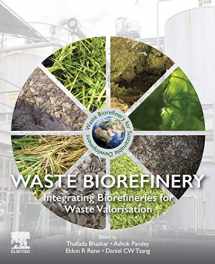
Waste Biorefinery: Integrating Biorefineries for Waste Valorisation
Book details
Summary
Description
Waste Biorefinery: Integrating Biorefineries for Waste Valorisation provides the various options available for several renewable waste streams. The book includes scientific and technical information pertaining to the most advanced and innovative processing technologies used for the conversion of biogenic waste to biofuels, energy products and biochemicals. In addition, the book reports on recent developments and new achievements in the field of biochemical and thermo-chemical methods and the necessities and potential generated by different kinds of biomass in presumably more decentralized biorefineries.
The book presents an assortment of case-studies from developing and developed countries pertaining to the use of sustainable technologies for energy recovery from different waste matrices. Advantages and limitations of different technologies are also discussed by considering the local energy demands, government policies, environmental impacts, and education in bioenergy.


We would LOVE it if you could help us and other readers by reviewing the book
Book review



